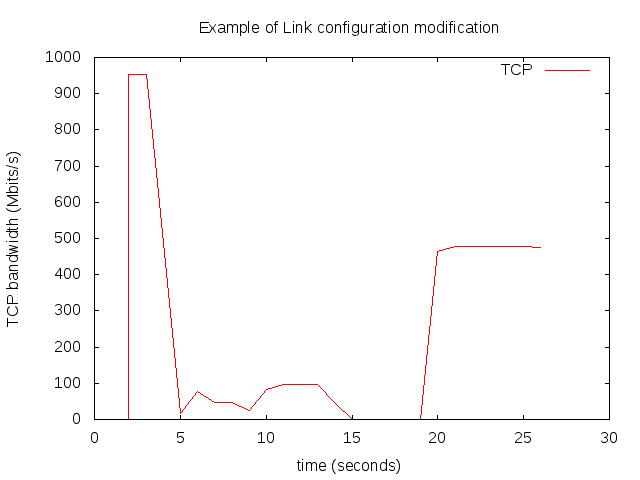Minievents 2.2.0
Mininet emulates a complete network of hosts, links, and switches on a single machine. To create a sample two-host, one-switch network, just run:
sudo mn
Mininet is useful for interactive development, testing, and demos, especially those using OpenFlow and SDN. OpenFlow-based network controllers prototyped in Mininet can usually be transferred to hardware with minimal changes for full line-rate execution.
Minievents is a Framework build over Mininet to introduce an event generator. Events are changes in a mininet network at specific times.
Events in Minievents are defined in an external json document. Up to now the implemented events are TCP and UDP traffic (iperf) and link properties modification (delay, bandwidth).
Minievents is a child class of Mininet class. It adds events_file argument to specify the json event document. There is no Minievent CLI up to now.
The main of the minievents.py provides a simple example of Minievents framework. It is a single switch topology with two host. Just run from the project root directory:
sudo python mininet/minievents.py
This command will use mininet/minievents.json as event source file. The events define a UDP and TCP streams starting at second 2, and the link between h1 and s1 is modified at second 5 (50 Mbps bandwidth), at second 10 (100 Mbps bandwidth and 100 ms delay), second 15 (100 % loss) and second 20 (0% loss and 500 Mbps bandwidth). The network is stopped at second 30.
Next Graphs are generated with data extracted from iperf output:

The minievents.json is an example of the json definition of events for minievents Framework. The file should be an array of Json objets (the events) with the following members:
- time: time in seconds since launch when the event should happen.
- type: event type. Up to now, the following event types are present
- iperf: data traffic generator
- editLink: edit Link properties.
- stop: stop the network
- params: parameters for the event.
The events are:
The editLink event modifies the properties of a link and takes the next parameters:
- src: name of the source node of the link
- dst: name of the destination node of the link.
- loss: percentage of packet loss in the link
- bw: link bandwidth in Mbits/sec
- delay: in milliseconds
- (...) It should work with any of the config parameters of the Mininet TCIntf class.
The iperf event creates a traffic stream between two hosts (TCP or UDP) and takes the next parameters:
- src: name of the source node
- dst: name of the destination node
- protocol: L4 protocol, should be TCP (default) or UDP.
- duration: duration of the traffic stream in seconds.
- bw (for UDP only): transmission in bits/sec.
The iperf client and server process outputs to the files:
output/iperf-{TCP-UDP}-{client|server}-{src}-{dst}.txt
- Carlos Giraldo AtlantTIC Research Center, University of Vigo, Spain http://atlanttic.uvigo.es/en/